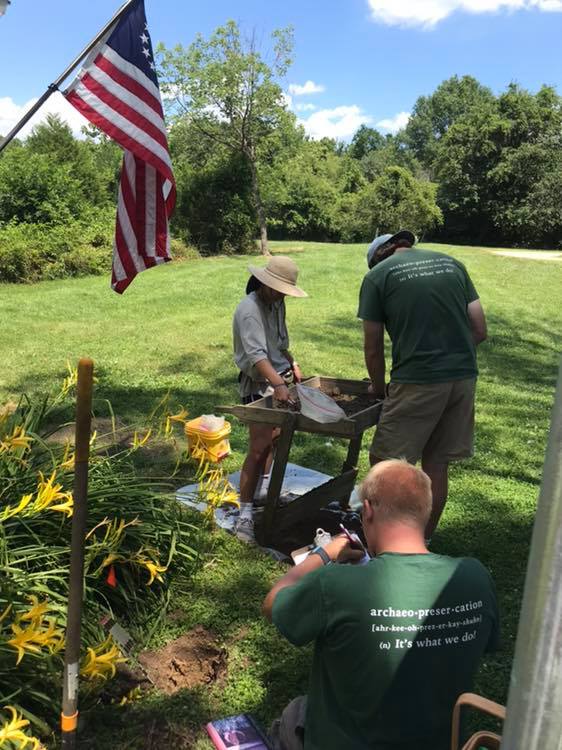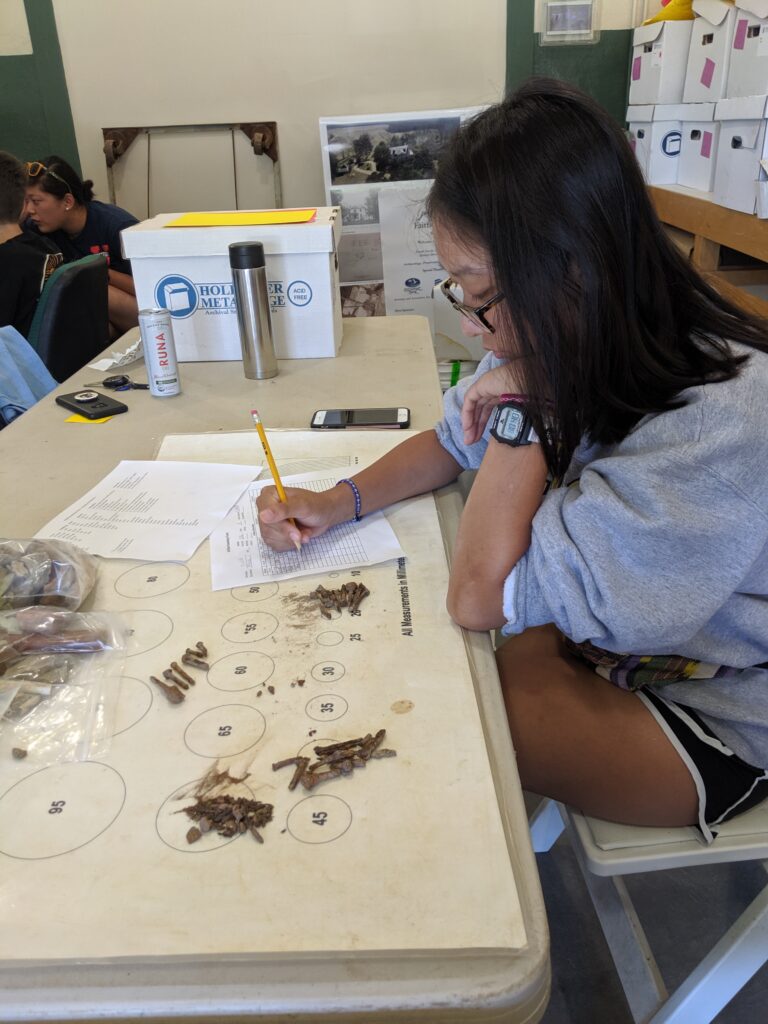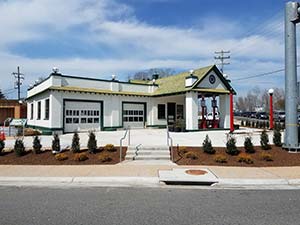Guest blog by summer intern Rachel Shin, a high-school student from Harrisburg, Pennsylvania.
Week 1:
On the first day of my internship, I got to dive into field work right off the bat. We made the short trip to Tucker Store in Gloucester Courthouse, a lot where a general store once stood. I began excavating a pit with three others: Naomi (intern), Billy (intern), and Dalton (employee who supervised us). As I had prior experience in excavating, I manned the screen while Naomi and Dalton learned how to trowel. We found a lot of nails and glass, and even a small iron key. I hadn’t done field work since last October, so working at Tucker Store was a good way for me to get back into the swing of things and get to know some of the other Fairfield interns and employees.
The next day, I had the privilege of attending a meeting concerning Rosewell with Dave and Thane, and got to talk with them about some of the more administrative tasks in archaeology such as negotiating easements. Afterward, I talked with Dave about potential projects I could work on during my internship. The foundation heavily advocates for giving students freedom to explore and utilize their resources in a learning capacity, so it was hard for me to choose between their wide array of options. Eventually I settled upon doing focused research on a feature excavated at Fairfield, culminating in a paper. Dave presented me with a few options for which feature to choose, and I settled upon feature 8, a subfloor pit in the slave quarter. I chose feature 8 because I felt drawn to studying life in the slave quarters, and also because the artifacts it contained were unlike anything I had excavated or studied before (raccoon baculum, cowrie shells, and a nine inch nail, to name a few).
The original topic of my paper concerned whether the owner of the items in the subfloor pit was African-American or white, as it was somewhat ambiguous whether a slave or a white tenant farmer resided in the quarter. Dave gave me some reading to do, as well as a caveat that the topic of my paper might be subject to change as I developed new interests while reading.
Week 2
Sure enough, as soon as I finished my first book, In Small Things Forgotten, I wanted to change my topic to focus on a fascinating new concept I had read about. At the outset of my second week, I told Dave that I wanted to change my topic to functional fixedness in archaeology, a type of cognitive bias that can hamper artifact analysis. He was supportive of this new idea and encouraged me to read more about archaeological theory, in which bias is a subject of much debate.
On Tuesday, I got to participate in Lab Night, where I helped sort artifacts and got to meet some great new people, including Jane and Colleen.
In the middle of my second week all of us took a trip to White Plains, a site in King George County. There I learned how to do STPs (shovel test pits) and how to use the transit. The owners of the property catered great food for lunch. Overall, it was a fun and relaxed day, but still very productive as I learned a couple new techniques.

For the rest of the week I researched functional fixedness and archaeological theory and began writing my paper. Dave guided me through this process by giving reading recommendations, helping me navigate the complex world of theory, and allowing me to bounce my ideas off him. We had a lot of good discussions throughout.
Week 3:
In my last week, I did the brunt of my writing for my paper. I did more research on psychology and archaeology and how they related to feature 8. I discovered various theories on subfloor pit function, such as the ancestor shrine theory and the personal storage area theory, and was able to complete my first draft by the end of the week.
On Wednesday, I worked with Anna and she taught me how to identify and catalogue an array of different artifacts, from porcelain to pipestems. This was very helpful to me, because I had never fully grasped the differences between certain wares of ceramics, different types of glass, etc., and the hands-on experience was very conducive to my learning.

Fairfield Plantation
On Thursday I was able to have a very informative discussion with Dave on possible career paths in archaeology. It was a privilege to learn about these potential careers from someone who has taken on many roles within the field. On Friday, my last day, I gave my paper draft to Dave and Anna and hoped for the best!
Reflecting on my time at Fairfield, it was a truly unique and special opportunity. Rarely does someone of my age and experience level get to explore the topics they love with support from people who are so invested in what they do and who they teach.

Rachel thank you so much for sharing your weeks with the people at Fairfield. If I were your age once again, I would have loved doing just what you are doing. I am fascinated with archeology, reading every article I come across. Functional fixedness is a topic I have often wondered about, although I didn’t know the phrase until reading you fine article. Once again, thank you!
Good luck to you, Rachel. You’ve studied with the best. Thanks for sharing your experience with us all.
David and Staff……Thanks for the time and guidance shared with Rachel.It is one of the oft spoken goals and gifts The Foundation provides for young people to understand our past and its influence on our presence and future.
Betty Z
It is always a joy to work with students. They bring new ideas and fresh perspectives and always makes our work interesting.
Rachel,
I enjoyed reading about your time at Fairfield. You write with an entertaining and engaging style. I must admit I too had never heard of “functional fixedness”. However cognitive bias creeps into many disciplines. Good on you to explore that in the field of archeology.
Wishing you the best in your future.